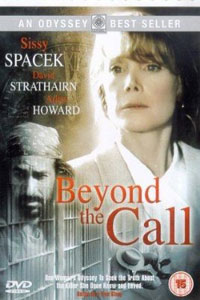
BEYOND THE CALL
US, 1996, 100 minutes, Colour.
Sissy Spacek, David Strathairn, Arliss Howard.
Directed by Tony Bill.
Beyond the Call, on the surface, is a film about capital punishment. However, it is also a film about the damage done to the Vietnam veterans.
The film focuses on David Strathairn as a returned Vietnam vet, traumatised after his experience in the war, angry and drunk on his return, clashing with police, defending himself, wanting to die, and killing a policeman. He is on Death Row. His girlfriend from high school days, played by Sissy Spacek, is now a happily married woman (husband played by Arliss Howard). She sees the news of the imminent execution of her friend in the newspapers and writes a letter. The consequences are that his sister gets in contact, she goes to visit, is able to persuade him to apply for hearings and stay of execution. However, he is ultimately executed. Her husband becomes upset by her visits to the prisoner. There are some flashbacks showing the bonds between the two when they were teenagers.
Sissy Spacek, as always, is very good as the woman trying to do the best for her friend. David Strathairn, also very able, is very good as the embittered man who changes somewhat as he prepares to die. Arliss Howard has a chance for a good performance towards the end of the film as he finally confronts the man about to die who challenges him to acknowledge the terrible things that he saw in Vietnam and which have been affecting his life.
The film was directed by Tony Bill, actor/director – directing such films as My Bodyguard, Flyboys.
1.The impact of the film? In the 1990s and the more immediate aftermath of the Vietnam war and its consequences? Later?
2.The title, its reference to Pam’s behaviour? To Russell and his encounters with Keith? Keith and his response? The Vietnam veterans going beyond the call of patriotism? And suffering?
3.The contrast between the Connecticut household and lifestyle, the South Carolina prison? The musical score?
4.Pam, married sixteen years, her children, love for Keith? Her school work? Reading the paper, the effect, the memories? Her writing the letter, not putting in the return address? Fran ringing her? Her going down, the meetings with Russell, their discussions? The emotional journey in these conversations, Russell mellowing, her breaking through, the applications for clemency? His gradual explanation of what happened? The flashbacks, his anger, the drinking, the death? His wanting to die? His relationship with his wife, with his sister? The final encounter with Keith, holding him, Keith’s admission of what happened in Vietnam? His doing good for people before he died? His point about killing the messenger but the message being valid? The final scene of his awaiting execution?
5.The effect on Pam, Keith and his wariness? His not talking about his own Vietnam experiences? Pam and her going back and forward, her concern? Her memories, her love for Russell? The kiss in the prison?
6.Keith, ordinary, his jealousy? Not talking about Vietnam? Pam asking him to go to the prison, his actually going in? His attitude and harshness towards Russell as a killer? Russell making him admit what happened, his talk, his tears? The immediate effect? Not talking to Pam? Russell’s phone call and urging Pam to get Keith to talk?
7.Fran, her concern?
8.The lawyer, his being upset, the discussions with Pam? Trying to help Russell?
9.The impact of the war in Vietnam on ordinary Americans? The hostile reception to many of the veterans? Their trauma and inability to cope? Their criminal behaviour? The consequences? The film as a challenge to American audiences to understand their veterans? The reality of the death penalty – and audiences for or against?